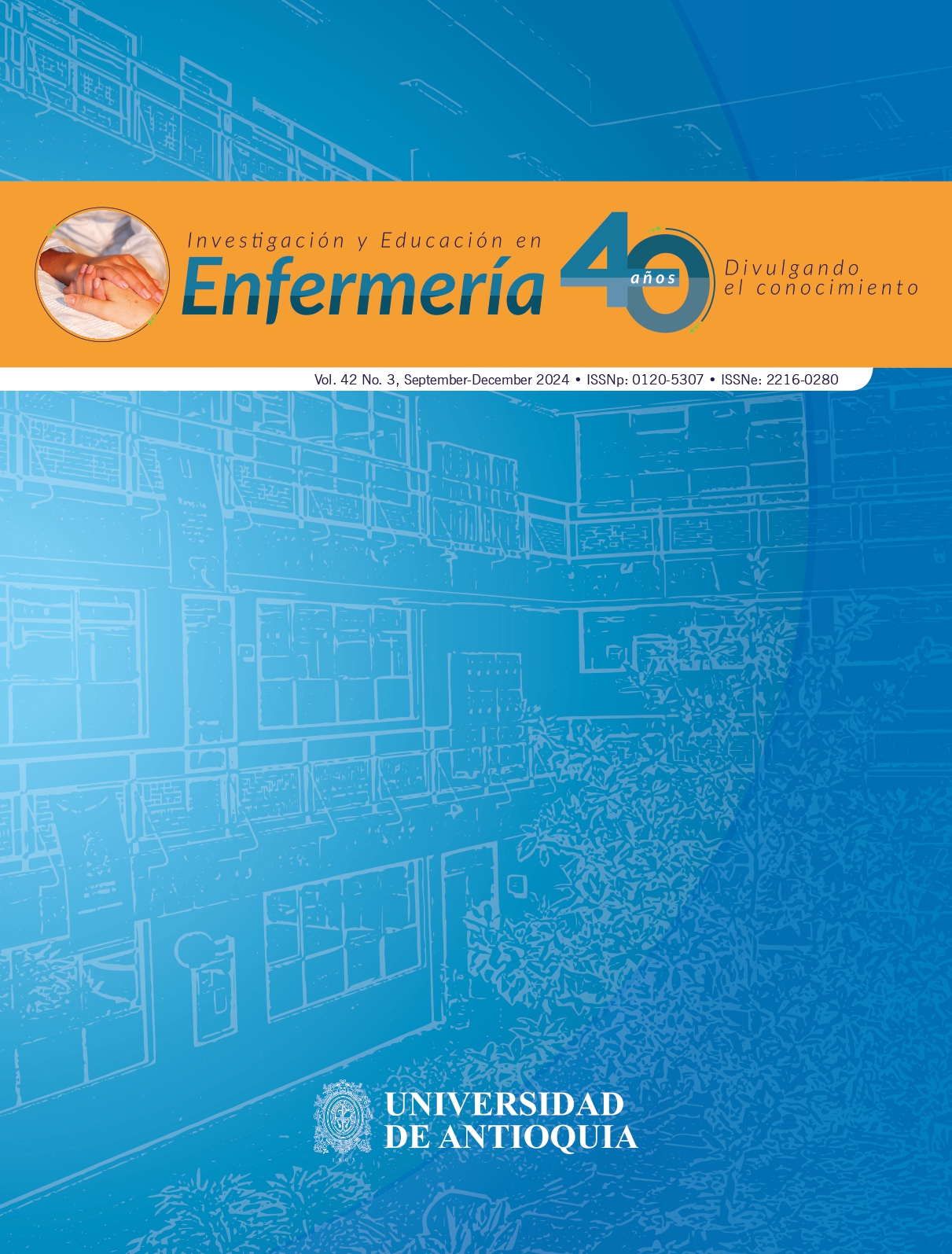“My Kidney Disease, My World as an Arena:” Unpacking the Situation of Adolescents from the Perspective of Postmodern Grounded Theory
DOI:
https://doi.org/10.17533/udea.iee.v42n3e04Keywords:
qualitative analysis, quality of life, nursing, grounded theory, adolescent healthAbstract
Objective. To explore the meanings of quality of life for adolescents with chronic kidney disease (CKD).
Methods. This qualitative study was conducted using a grounded theory situational analysis approach, following the interpretive turn. Four in-depth interviews were conducted with adolescents with CKD, five with parents, and four with healthcare professionals (three nurses and one physician). The collected data were analyzed using situational maps, social world/arenas maps, and positional maps, as proposed by Adele Clarke.
Results. The characterization of these adolescents’ situations shows that they are the main actors and modify their social role when they suffer from CKD. It is the mothers that traditionally care for them, until they regain their health. The social world map shows the interactions among the worlds of individuals, their families, and the healthcare system, constituting a well-being arena which defines the quality of life for adolescents with CKD. Discursive positions constitute a key element in the discussion concerning the relational dimensions of well-being and the feelings emerging in relation to the disease.
Conclusion. For adolescents with CKD, quality of life is defined as the state of well-being emerging from the recognition of their own environment in micro-, meso‑, and macro-systems, which bring together structural (political, cultural, symbolic) elements, discursive constructions, and the integration of interactions in the social arenas, as well as the representation of the main discourses and their positions.
Downloads
References
World Health Organization. Adolescent Health. WHO; 2018. Available from: https://www.who.int/health-topics/adolescent-health#tab=tab_1
Dembowska E, Jaroń A, Gabrysz-Trybek E, Bladowska J, Gacek S, Trybek G. Quality of life in patients with end-stage renal disease undergoing hemodialysis. Journal of Clinical Medicine. 2022; 11(6):1584.
Fibrianto A, Lestari H, Kesuma Y, Damayanti M, Fitriana E, Rismarini R. Quality of life in children with chronic kidney disease. Paediatrica. Indonesiana. 2023; 63(5):395-404.
Rodríguez N, Morocho S. Percepción de la calidad de vida en pacientes con trasplante renal. Vive Revista de Salud. 2023; 6(18):961-71.
Ruidiaz K, Higuita L. Impact of chronic kidney disease on health-related quality of life in the pediatric population: meta-analysis. Jornal de Pediatria. 2021; 97:478-89.
Clarke AE, Friese C, Washburn RS. Situational analysis: Grounded theory after the interpretive turn. Sage publications. 2018.
Foucault M. Technologies of the self: A seminar with Michel Foucault. Amherst: University of Massachusetts Press. 1988.
Deleuze G, Guattari F. Introduction: Rhizome, in a Thousand plateaus: capitalism and schizophrenia II, Minneapolis: University of Minnesota Press. 1987. P.3-25
Strauss A, Corbin J. Basics of Qualitative Research: Techniques and Procedures for Developing Grounded Theory. 2nd ed. Sage Publications Inc; 1998.
Ruidiaz K, Cacante J. Conceptualización teórica y metodológica del análisis situacional: un enfoque de la teoría fundamentada. Index de Enfermería. 2023; 32(4):e14673.
Guba E, Lincoln Y. Effective evaluation: Improving the usefulness of evaluation results through responsive and naturalistic approaches. Jossey-Bass; 1981.
Emanuel E. ¿Qué hace que la investigación clínica sea ética? Siete requisitos éticos. Pautas éticas de investigación en sujetos humanos: nuevas perspectivas. Santiago: Programa Regional de Bioética OPS/OMS,2003; 83-96.
Farhane N., Luque B, Tabernero C, Castillo R. Factors associated with gender and sex differences in anxiety prevalence and comorbidity: A systematic review. Science Progress. 2022;105(4):00368504221135469.
Schoemaker C, van Geelen S, Allewijn M, Fernhout M, van Vliet R, Wulffraat N. Self-management support for young people living with fluctuating chronic diseases. Archives of Disease in Childhood. 2022; 107(7):658-9.
Chen H, He Q, Zeng Y, Wang L, Yu H, Yin W, et al. Feeling like the sky is falling down: Experiences of parents of adolescents diagnosed with cancer in one‐child families in China–A qualitative study. Journal of Clinical Nursing. 2022; 31(5-6):733-43.
Courtwright S, Le Pard A, Jones J. Emotional wellbeing in adolescents living with chronic conditions: A metasynthesis of the qualitative literature. Journal of Adolescent Health. 2022; 70(6):864-76.
Silva J, Luz E, Tavares J, Girardon-Perlini N, Magnago T. Resilience of family caregivers of children and adolescents with cancer and associated factors: Mixed method study. Texto & Contexto-Enfermagem. 2022; 31:e20220133.
Balboni T, Vander Weele T, Doan-Soares S, Long K, Ferrell B, Fitchett G, KohH. Spirituality in serious illness and health. Jama. 2022; 328(2):184-97.
Pan American Health Organization (PAHO). Enfermedades renales crónicas. Documento orientador. 2023. Available frrom: https://www.paho.org/es/documentos/enfermedades-renales-cronicas-documento-orientador
Rico J, Yama-Mosquera E, Robayo A, Aroca G, Arango J, Barros L, Acuna L. Situación de la enfermedad renal crónica en Colombia. Nefrología Latinoamericana. 2022; 19:79-87
Colombia. Ministerio de Salud. Ley 100 de 1993, por el cual se crea el sistema de seguridad social integral y se dictan otras disposiciones. Bogotá: El Ministerio de salud; 1993.
Kogon A, Hooper S. Mental health and social-emotional functioning in children and adolescents with chronic kidney disease. Pediatric Nephrology. 2023; 39: 2015-31.
Published
How to Cite
Issue
Section
License
Copyright (c) 2024 Investigación y Educación en Enfermería

This work is licensed under a Creative Commons Attribution-NonCommercial-ShareAlike 4.0 International License.
Derechos de propiedad / Direitos de Propriedade
English: If the article is accepted for publication, all copyright will be of exclusive property of Investigación y Educación en Enfermería. The text and the graphics included in the publication are exclusive responsibility of the authors and not necessarily reflect the thought of the Editorial Committee.
Español: Si el artículo es aprobado para publicación, todos los derechos son de propiedad de Investigación y Educación en Enfermería. El texto y las gráficas incluidas en la publicación son de exclusiva responsabilidad de los autores y no necesariamente refleja el pensamiento del Comité Editorial.
Português: Se o artigo for aceito para publicação, todos os direitos autorais serão de propriedade exclusiva de Investigación y Educación en Enfermería. O texto e os gráficos incluídos na publicação são de responsabilidade exclusiva dos autores e não refletem necessariamente o pensamento do Comitê Editorial.















